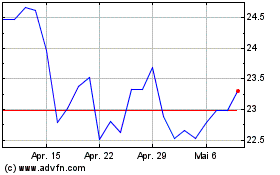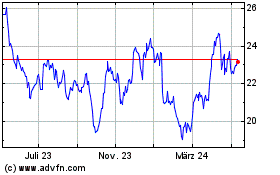Peter Munk, Freewheeling Founder of Barrick Gold, Dies in Toronto at 90
28 März 2018 - 11:41PM
Dow Jones News
By Alistair MacDonald and James R. Hagerty
Peter Munk escaped Nazi-occupied Hungary to become a
freewheeling international entrepreneur and founder of Barrick Gold
Corp.
Aside from building Barrick through takeovers into the world's
largest gold miner, he helped create a maker of stylish stereo
equipment, made abortive efforts to enter the auto-manufacturing
business, developed hotels in the South Pacific and built a marina
for giant yachts in Montenegro.
Mr. Munk died Wednesday in Toronto, Barrick said. He was 90.
He was born in Budapest Nov. 8, 1927, into an affluent Jewish
family whose fortune derived from real estate and distribution of
Viennese chocolates.
In 1944, when the Nazis invaded Hungary, he escaped to
Switzerland on a train that would prove one of the last routes out
of the country for Jews. His mother, who survived the Auschwitz
concentration camp, wrote him after the camp was liberated and told
him he shouldn't stay in Europe but go instead to North America.
"Get a decent, nice job and earn a lot of money," she wrote.
Mr. Munk arrived in Canada with a single suitcase and supported
himself as a student in Toronto partly by selling Christmas trees.
He was struck by Canadians' hospitality. "In Canada, in my friends'
kitchens, the fridges were always open," he once told a reporter.
"In Switzerland, you had to know someone a decade before you got
invited to their home."
He earned a degree in electrical engineering at the University
of Toronto and met fellow student David Gilmour. In 1958, they
founded Clairtone Sound Corp., which put high-end turntables and
stereo speakers into sleek, Scandinavian-style cabinets.
The company established the founders as dashing young
entrepreneurs but was chronically short of cash. Seeking greater
scale, they diversified into making television sets and persuaded
the province of Nova Scotia to finance a new factory in the town of
Stellarton.
The business floundered, partly because of the factory's remote
location and lack of a workforce skilled in manufacturing. The
provincial government took over the business in 1968 and it closed
down several years later.
Mr. Munk's guiding principle was that the "only thing in life
that is constant is change," and that helped him adapt and move
into new businesses, Mr. Gilmour said in a 2012 interview. Grateful
to have been welcomed into Canada as a young man, he also was
determined to succeed in his adopted country.
Mr. Munk tried unsuccessfully to enter the automotive industry,
first with a plan to assemble Japanese cars in Canada and then with
an abortive effort to buy the dying maker of Studebaker cars.
He and Mr. Gilmour rebounded to create South Pacific Properties
Ltd., which opened hotels in Fiji, Tahiti, Australia, New Zealand
and elsewhere. After Egyptian President Anwar Sadat halted South
Pacific Properties' attempt to build a resort near the pyramids
outside Cairo, Mr. Munk sold the company in 1981.
In 1983, Messrs. Munk and Gilmour teamed up again, this time
betting that gold prices -- long in the doldrums -- were ready to
rebound. They formed Barrick, listed its shares on the Toronto
Stock Exchange and bought a half interest in an Ontario mine.
Riding a boom in the price of gold, the company quickly gobbled up
mines. By 2006, Barrick owned 27 mines world-wide.
In 2011, Barrick paid $7.65 billion for copper miner Equinox
Minerals Ltd. just as copper prices started to slide. A sharp
decline in gold prices hit profits, and the company was plagued by
cost overruns as it tried to extract gold and silver from beneath
glacial ice at the Pascua-Lama project in the Andes on the border
of Argentina and Chile. Those setbacks hammered Barrick's share
price and turned some investors against Mr. Munk.
He clung to his role as chairman as the company sold assets and
slimmed down. But gold prices continued to fall and in 2014 he
stepped down from Barrick's board at age 86.
In mining, the fedora-wearing Mr. Munk stood out as a flamboyant
and energetic entrepreneur. He skied into his 80s and had a home in
the Swiss ski village of Klosters.
One of his last projects was leading a group of investors who
built the Porto Montenegro marina on the site of a former
Yugoslavian naval base on the Adriatic Sea. In 2016, he announced
the sale of the marina to the Investment Corp. of Dubai.
Mr. Munk is survived by his wife of 45 years, Melanie Bosanquet.
His first marriage, to Linda Gutterson, a professor of English
literature, ended in divorce. She died in 2013. He also is survived
by five children and 14 grandchildren.
He made large donations to the Toronto General & Western
Hospital, the University of Toronto and Technion -- Israel
Institute of Technology. He also provided funding for the
Toronto-based Aurea Foundation, which encourages discussion about
public policy.
A bronze bust of Mr. Munk gazes imperiously on the reception
hall in Barrick's Toronto headquarters. On its base are the words:
"Peter Munk, founder, builder, visionary."
Write to Alistair MacDonald at alistair.macdonald@wsj.com and
James R. Hagerty at bob.hagerty@wsj.com
(END) Dow Jones Newswires
March 28, 2018 17:26 ET (21:26 GMT)
Copyright (c) 2018 Dow Jones & Company, Inc.
Barrick Gold (TSX:ABX)
Historical Stock Chart
Von Mär 2024 bis Apr 2024

Barrick Gold (TSX:ABX)
Historical Stock Chart
Von Apr 2023 bis Apr 2024
